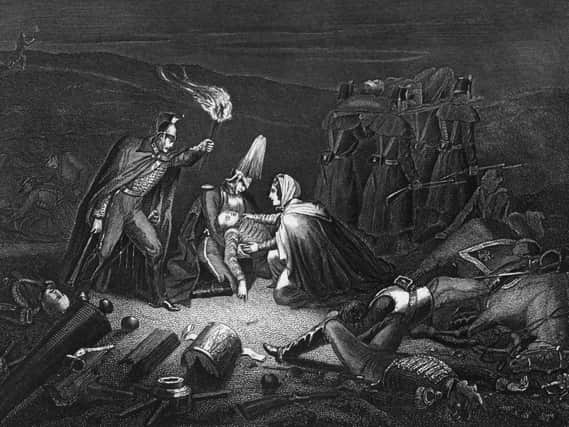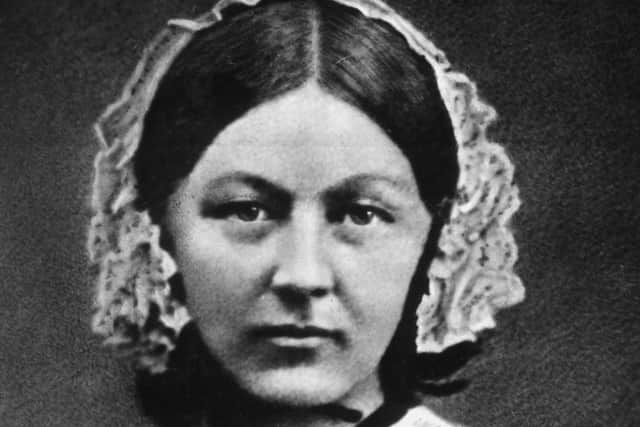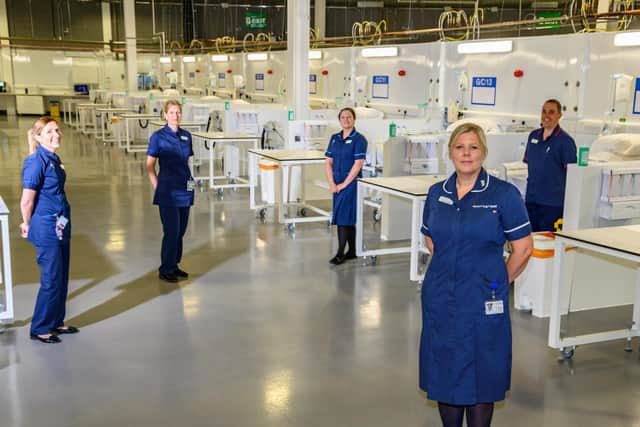Florence Nightingale - the pioneering nurse and her lasting legacy


Such a sentiment may indeed seem strange, but in the mid-19th century hospitals were a far cry from the clean, hi-tech places we recognise, and the nurses who slogged in them certainly weren’t revered as heroes like they are today.
Florence Nightingale, who was born 200 years ago next month, is often depicted as ‘the lady with the lamp’ who, like her modern day counterparts working on the NHS frontline, put her life at risk to help the sick.
Advertisement
Hide AdAdvertisement
Hide AdAs a trailblazing pioneer who transformed the nursing profession and helped lay the foundations for modern health care, she also left a lasting legacy.


During the Crimean War she led a team of British women who transformed the way sick and injured soldiers were treated, but she was also a prolific writer, social reformer and a leading figure in the use of data.
Dr Stella Butler is a science historian and the University of Leeds’s most senior librarian, and has researched and written about Florence Nightingale.
“Every now and again I read some of her letters [some are held at the university’s Brotherton Library] and you see that she was an absolute heroine to nurses and rightly so,” says Butler. “She made nursing a respectable profession for middle class girls.”
Advertisement
Hide AdAdvertisement
Hide AdFlorence came from a well-to-do middle class family herself. She was educated at home by her father and excelled in maths and science. Her love of recording and organising information was evident from an early age – she documented her extensive shell collection with precisely drawn tables and lists.


It was also clear that the conventional route for women at the time – marriage and motherhood – was never going to be enough to satisfy someone with her determination and zeal. Her parents weren’t in favour of her becoming a nurse but were unable to dissuade her from following what she felt was her chosen path.
“She was very religious and she believed that she had a ‘calling’ and this was to nurse and to do good,” says Butler.
It was the Crimean War that made Florence a household name. When war broke out in 1853, newspaper reports from the front line told horror stories of the appalling conditions in British army hospitals and Florence led a team of British women that was sent to the region, on the northern coast of the Black Sea.
Advertisement
Hide AdAdvertisement
Hide AdThe conditions that greeted them in the makeshift hospitals were atrocious with the floor thick with faeces. Undaunted, she set her nurses to work cleaning the hospital and ensured soldiers were properly fed and clothed.
Florence herself was described as a “ministering angel” who walked the corridors at night, long after the medical officers had retired.
When a portrait of Florence carrying a lamp and tending to patients appeared in the press, she became famous almost overnight.
Butler says her work in Crimea revolved around patient care and hospital administration. “She was a fantastic leader who got people pulling together and in some respects there are parallels with today, she sorted supply lines out and the organisation of the military hospitals and made sure they were clean.”
Advertisement
Hide AdAdvertisement
Hide AdThe Crimea was rife with infectious diseases back then and Florence paid a price for her own selflessness. “She came back to England with multiple problems and was ill for quite a long time afterwards, she was unable to walk at various times.”
When she returned to England in 1856, she did so incognito to avoid being recognised, because although she understood the importance of publicity she wasn’t interested in being in the limelight herself. “She was very much a recluse but she was also a great communicator and influencer who targeted people in positions of power,” says Butler.
Florence campaigned to improve nursing and contributed to various statistical societies about the importance of evidence-based health care.
“One of her biggest contributions in the 19th century was around the idea of hospital buildings as places that needed careful design so that they didn’t make you more sick, which is what they did previously.
Advertisement
Hide AdAdvertisement
Hide Ad“She became a great promoter of the pavilion design and was consulted over a number of hospitals, including Leeds General Infirmary.”
She set up the Nightingale School at St Thomas’s Hospital where the best nurses (known as ‘Nightingale Nurses’ –schooled in her methods and ingrained with her values) were trained, and she even had a ward-type – the ‘Nightingale Ward’ – named after her.
Her achievements are all the more remarkable given the fact she was operating in a male-dominated world. “It’s fair to say she wasn’t a revolutionary,” says Butler. “On the other hand, it was very clear that she thought women nurses should be in charge of hospitals.
“But she wasn’t part of the group in the 1860s that started the campaign for women’s suffrage. By that time she was very much taken up with hospital reform and the establishment of the nurse school.”
Advertisement
Hide AdAdvertisement
Hide AdShe became a hugely popular public figure during her own lifetime. “I think that took her by surprise in many ways. But she had the ear of politicians, she was invited to meet the Queen and Prince Albert and she was appointed to the Order of Merit – I think she was the first woman to be given that honour – so she was an enormously important public figure.”
All of which adds to a lasting legacy. “Nursing today is very different from nursing in the late 19th century, largely because it’s a much more technical profession. She was nursing before anaesthetics and before blood typing and so on, and it was actually quite limited what medicine could do.
“But she is important in establishing the role of care for patients and highlighting the importance of the environment a patient is kept in. She was very much driven by the evidence – this is what the numbers are telling us and this is what we should do.”
There was also her compassion. “Treating patients with respect and giving the patient – no matter how ill they were, or what their economic circumstances were – the best possible care was at the heart of what she did.”
Advertisement
Hide AdAdvertisement
Hide AdSo it’s fitting that 200 years after her birth, with the country in the grip of a national health emergency, that we still take inspiration from Florence Nightingale.
“She was formidable and I don’t think she was scared of anybody. She was very good at seeing how something could work and knitting everything together and presenting the case, and we owe her a lot.”
Editor’s note: first and foremost - and rarely have I written down these words with more sincerity - I hope this finds you well.
Almost certainly you are here because you value the quality and the integrity of the journalism produced by The Yorkshire Post’s journalists - almost all of which live alongside you in Yorkshire, spending the wages they earn with Yorkshire businesses - who last year took this title to the industry watchdog’s Most Trusted Newspaper in Britain accolade.
Advertisement
Hide AdAdvertisement
Hide AdAnd that is why I must make an urgent request of you: as advertising revenue declines, your support becomes evermore crucial to the maintenance of the journalistic standards expected of The Yorkshire Post. If you can, safely, please buy a paper or take up a subscription. We want to continue to make you proud of Yorkshire’s National Newspaper but we are going to need your help.
Postal subscription copies can be ordered by calling 0330 4030066 or by emailing [email protected]. Vouchers, to be exchanged at retail sales outlets - our newsagents need you, too - can be subscribed to by contacting subscriptions on 0330 1235950 or by visiting www.localsubsplus.co.uk where you should select The Yorkshire Post from the list of titles available.
If you want to help right now, download our tablet app from the App / Play Stores. Every contribution you make helps to provide this county with the best regional journalism in the country.
Sincerely. Thank you.
James Mitchinson
Editor
Comment Guidelines
National World encourages reader discussion on our stories. User feedback, insights and back-and-forth exchanges add a rich layer of context to reporting. Please review our Community Guidelines before commenting.